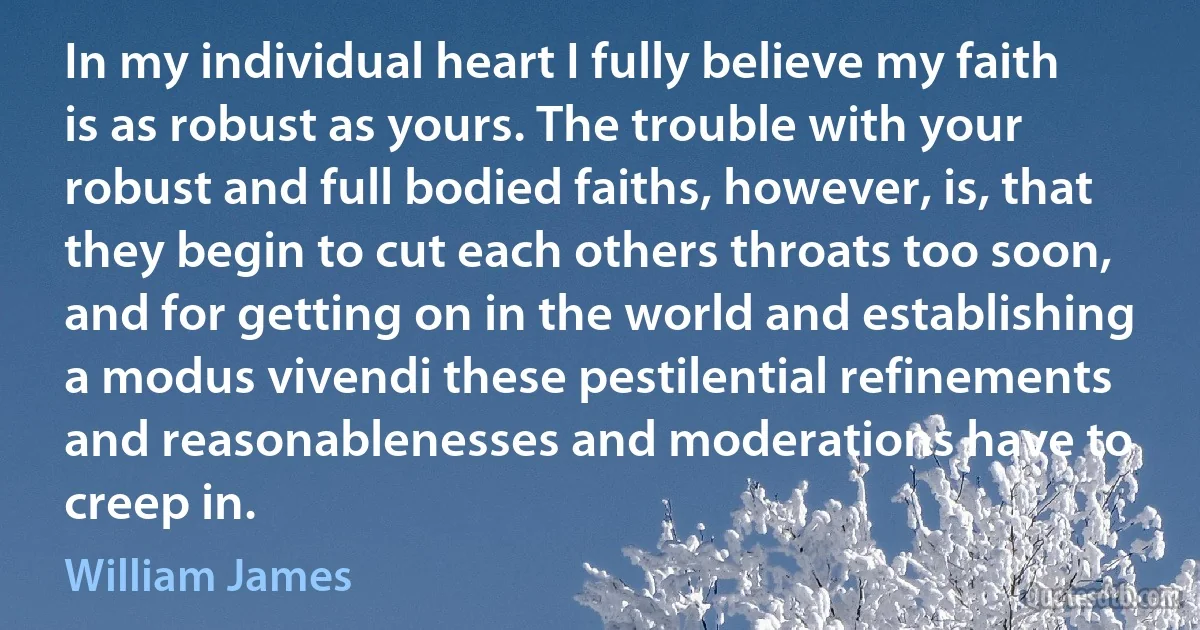Modus Quotes
Candidate Obama was either exceptionally naive or willfully disingenuous when he vowed to change the way Washington works. The very promise of Hope and Change was rooted in uprooting the Washington modus operandi. But instead of rejecting it, he embraced it all - the secrecy, the closed doors, the political favors, the near-criminal negligence.

Reince Priebus
Mrs. Gandhi has only one dream: to take over the whole sub continent, to subjugate us. She'd like a confederation so as to make Pakistan disappear from the face of the earth, and that's why she says we're brothers, and so forth. We're not brothers. We never have been. Our religions go too deep into our souls, into our ways of life. Our cultures are different, our attitudes are different. From the day they're born, to the day they die, a Hindu and a Muslim are subject to laws and customs that have no points of contact. Even their ways of eating and drinking are different. They're two strong and irrecon cilable faiths. It's shown by the fact that neither of the two has ever succeeded in reaching a compromise with the other, a modus vivendi. Only dictatorial monarchies, foreign invasions, from the Mongols to the British, have succeeded in holding us together by a kind of Pax Romana. We've never arrived at a harmonious relationship.

Zulfikar Ali Bhutto
DOGS, KIDDIE PORN & STAR TREK: (Hey, that's a good book title). Unfortunately, I was out with Cosmo when the conversation got interesting around here. First of all, while I think it is wrong to judge dogs by human political categories they most certainly aren't liberals. Dogs may try to run your life, but they do not much care about running the lives of people they've never met. And still, they are willing to judge others -- and admit it. They are morally pragmatic, loyal and willing to share with family while outraged or flummoxed by the idea of taxation for the benefit of people or dogs they don't know. They firmly believe in sexual harassment as a modus vivendi. They believe nature is a tool. They are not vegetarians and reject animal rights. They chuff at egalitarianism. In short, I think they are Monarchists; they believe in something very close to a Great Chain of Being with humans and dogs at the top (and, even at the top humans and dogs have different ranks).

Jonah Goldberg
A factor that is almost indispensable to this kind of behavior [serial killing] is the mobility of contemporary American life. Living in large centers of population, and living with lots of people, you can get used to dealing with strangers. It's the anonymity factor, and it has a twofold effect. First of all if you're among strangers you're less likely to remember them, or care what they're doing or what they should, or should not, be doing. If they should or shouldn't be there. Secondly, you're conditioned almost not to be afraid of strangers. Mobility is very important here. As we've seen...the individual's [himself in third person] modus operandi was moving large distances in an attempt to camouflage what he was doing. Moving these distances, he was able to take advantage of the anonymity factor.

Ted Bundy
In your number of March 3rd [1860] I observe a long quotation from The Times, stating that Mr. Darwin "professes to have discovered the existence and modus operandi of the natural law of selection," that is, "the power in nature which takes the place of man and performs a selection, sua sponte," in organic life. This discovery recently published as "the results of 20 years' investigation and reflection" by Mr. Darwin turns out to be what I published very fully and brought to apply practically to forestry in my work Naval Timber and Arboriculture, published as far back as January 1, 1831, by Adam & Charles Black, Edinburgh, and Longman & Co., London, and reviewed in numerous periodicals, so as to have full publicity in the "Metropolitan Magazine," the "Quarterly Review," the "Gardeners' Magazine," by Loudon... and repeatedly in the "United Service Magazine" for 1831, &c. The following is an extract from this volume, which clearly proves a prior claim. [excerpt follows].

Patrick Matthew
Henry Howard, R.A., was an early friend of my father's; and he and Turner have stayed with us at Heston. I remember, when I was about five years old, going to Penn, in Buckinghamshire, with Howard, Turner, and my father [c. 1812]; all of them in search of the picturesque. We went in a post-chaise, and, when tired, my father carried me pick-a-back. We came to a halt in a grove or copse where luxuriated wild flowers in profusion. It was a charming day; and, though so many 'years bygone' I can see now vividly before me my father and Howard, both standing legs a-straddle, and Turner at a little distance in a ditch, all hard at work at the easthetical. After a while Turner emerged from his retreat with a capital water-colour, with which Howard and my father were in raptures. He said he got into the ditch to avoid the sun, but Howard whispered my father that it was to avoid showing his modus operandi. I have heard this from my father subsequently..

J. M. W. Turner
His trademark has always been to sidestep the accepted version of the facts, a modus operandi that served him well during the Vietnam war, in the apocalyptic post-Pol Pot Cambodia, the killing fields of East Timor and countless other hotspots... becoming an octogenarian hasn't mellowed him in the least.

John Pilger
The system absorbs those who think they can utilize it. Nor can there be any question of finding a modus vivendi or achieving attenuations. It has been demonstrated how the liberal state becomes an authoritarian state. The course is set and no accommodation will be either lasting or sufficient.
In face of this absolute power, only an absolutely negative position is viable. What we have in mind is the attitude that conscientous objectors take on a specific point, and not without good reason. In the present set-up the anarchist attitude of a total refusal of validity or legitimacy to any authority of any kind seems to me to be the only valid and viable one. The point is not to enforce a particular view of society but to establish a counterbalance, a protest, a sign of cleavage. In face of an absolute power only a total confrontation has any meaning.

Jacques Ellul


